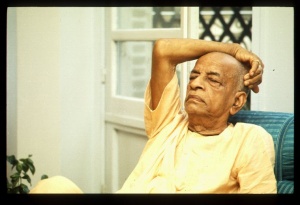CC Madhya 25.194 (1975)

A.C. Bhaktivedanta Swami Prabhupada
TEXT 194
- tabe subuddhi-rāya sei 'chadma' pāñā
- vārāṇasī āilā, saba viṣaya chādiyā
SYNONYMS
tabe—upon this; subuddhi-rāya—Subuddhi Rāya; sei—that; chadma—plea; pāñā—getting an opportunity; vārāṇasī āilā—came to Vārāṇasī; saba—all; viṣaya chādiyā—giving up the implications of material activities.
TRANSLATION
Taking the Nawab's sprinkling water upon him as an opportunity, Subuddhi Rāya left his family and business affairs and went to Vārāṇasī.
PURPORT
It appears that Subuddhi Rāya was a big landholder and a responsible, respectable gentleman. He could not, however, avoid the social misconception that one becomes a Mohammedan when water is sprinkled on one's face from a Mohammedan's pitcher. Actually he was planning to give up his material life and leave his family. Hindu culture recommends four divisions-brahmacarya, gṛhastha, vānaprastha and sannyāsa. Subuddhi Rāya was thinking of taking sannyāsa, and by the grace of Kṛṣṇa, he received this opportunity. He therefore left his family and went to Vārāṇasī. The system of varṇāśrama-dharma is very scientific. If one is directed by the varṇāśrama institution, he will naturally think of retiring from family life at the end of his life. Therefore sannyāsa is compulsory at the age of fifty.